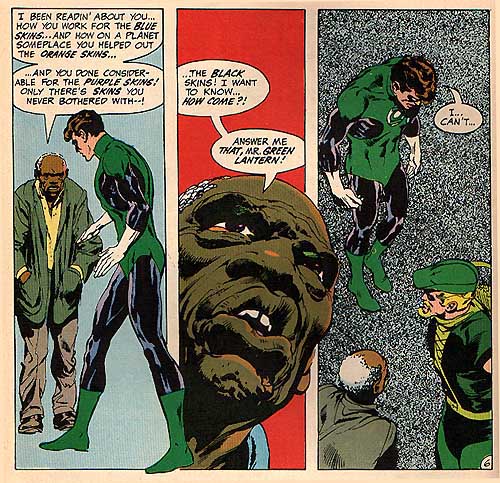I read this
this quote on why the old Legion of Superheroes comics had no black
people from co-creator Mike Grell.
“Their explanation for
why there were no black people [in the Legion] was that all the black people
had gone to live on an island. It's possibly the most racist concept I've ever
heard in my life."
WHAT. THE.
ASS.
Granted,
that’s was decades ago, but it’s always been interesting how comics handle
race. Recently, DC has introduced an Arab-American Green Lantern, who seems to
be their favorite character to diversify. It’s just sort of interesting that
whenever they need to add someone with diversity they immediately use a GL.
Green
Lantern has always had some racially provocative storylines thanks to Neal
Adams, who put the very 1950s conservative minded GL alongside ultra-hippie
Green Arrow which allowed for a lot of political discussion and some pretty
incredible issues, including the introduction of African-American Green Lantern
John Stewart and this fantastic panel.
Still,
there is not a lot of diversity in comics. Part of the fact is that these
characters have been around since the 30s. The first mainstream black superhero
was Black Panther. Before him there were black supporting characters, like the
Spirits woefully racist caricature of a sidekick, but no real black badasses
like Black Panther. He fought the KKK, Apartheid, and Doctor Doom.
Asians are no
longer regulated to the mystic sorcerer role, or do something involving katanas
(like that one Outsider, Katana). It’s a step up from the Fu Man Chu-esque Iron
Man villain literally called the Mandarin. The Atom is chinese, and Grant
Morrison introduced two Japanese superhero squads known as Big Science Action
and Super Young Team in Final Crisis
who were just awesome in general.
Hispanics
are sort of new to the scene, with a surprising few in the mainstream outside
of Blue Beetle and the Question. In researching this (read: looking up lists of
Hispanic superheroes on Wikipedia) I was rather surprised to find out the Kyle
Rayner counts because he is Half-hispanic Half Irish. I imagine we will se a
rise in both Middle Eastern and Hispanic superheroes soon as the demographics
continue to change, but I think there is a bigger problem at play here than
just having these characters on hand.
One of the
reasons characters like John Stewart, Luke Cage, or Black Panther work is
because they are badasses. A lot of times, comic companies will add “diversity
hires” to the JLA or Avengers and then not really know what to do with them. To
me, this is worse than not having anyone at all. Just sort of sticking someone
in because the your super team wasn’t filling some sort of 501c3 requirement (I
imagine the X-men do not pay taxes) is sort of missing the point.
I really
like Grant Morrison’s decision to use an Algerian immigrant for the Batman of
Paris. There is still a general lack of Muslims in the multiverse, and this was
a major step forward. The reason this works isn’t just because it’s a nice
addition of diversity, but because the dude was awesome. It also worked well
with the racial tensions currently plaguing France. It was a really solid call
on their part, and that’s the kind of thing I applaud.
When you
look at the covers of most comics today, it does seem like they’re still sort
of stuck in the Leave it to Beaver
era of American entertainment where everyone is incredibly white. The problem
is that is not what America looks like any more. We’re a pretty diverse
country, and our heroes need to reflect that. I’m not saying we should up and
make Superman and Wonder Woman black (besides, Grant Morrison did it in Final Crisis. They were supposed to be
Barack and Michelle Obama.), but it wouldn’t hurt to consider bringing more
diversity to the forefront in the interest of story rather than headlines. As
fun as it is to make One Million Moms go crazy because Nova is going to marry
his boyfriend, how about giving Nova a storyline that doesn’t just revolve around him being different. Batwoman has
handled that really well, and I think a lot of other books that could take
example from that idea of “yes, she’s a lesbian, now lets move on and watch as
punches some dude in the teeth”.
The best
example of how diversity has been handled is with Jewish Characters. I think
part of this has to do with half the people who write comics are Members of the
Tribe, but the way they’re handled is really, really good. We get some big
names, including Magneto, Shadowcat, Iceman, the everlovin’ blue-eyed thing,
and the aforementioned Batwoman. These characters not only get storylines where
their Judaism is the subject, but they also are allowed to develop far beyond
that as actual characters who do things and are awesome in their own right.
That’s what
I’d really like to see. Lets have more ass-kicking as less trying to get
articles in USA Today. Nobody reads it anyway, and having an Arab-American or
homosexual Green Lantern doesn’t have any impact if you just do one story on
how he is Arab-American or homosexual and then immediately go back to writing
about Hal Jordan. Give them their own titles and see what you can do with them
beyond sticking them in the background. If you want to really promote diversity
and the American way (I think Superman would have something to say about that),
let them actually do something.
